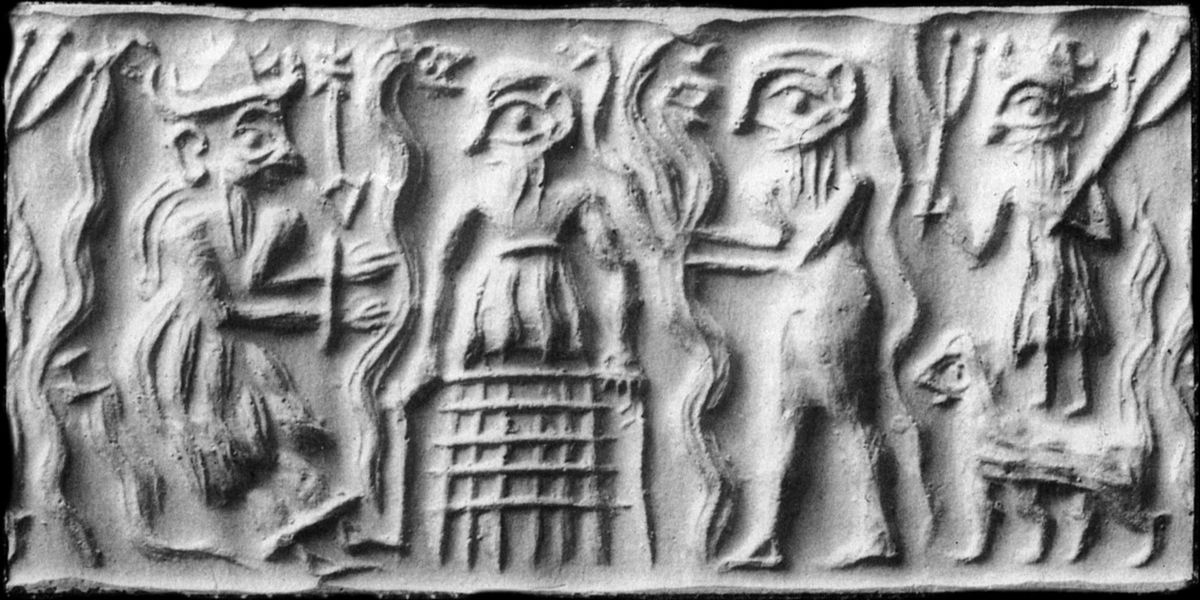The Ghouls of Ancient Mesopotamia: The Gallas

Photograph of a depiction of Dumuzi/Dumuzid being tortured by gallas, public domain
As I've told you before, I'm currently writing three novels: Mechanical Gods & Monsters, The Skeleton Faerie, and The Gods Are Rotting.
Since Mechanical Gods and Monsters is a reimagining (and not an entirely faithful one, either) of a Greek myth that I'm extremely familiar with, I haven't had to do much research for it. However, since The Skeleton Faerie is inspired by fairies and the mythologies they come from, and since The Gods Are Rotting is inspired by all world mythologies, I've had to do quite a bit more research for those books.
That's not to say I wasn't at all familiar with the subjects before. It's just that they're so expansive and (at times) incredibly complex. I've had to reread a lot of the books I already had on the subjects + find new books and read them + engage in many late-night internet searches to double, triple, and quadruple check that what's going into these books makes sense and lines up with the lore they're inspired by.
All that said, in my research for The Gods Are Rotting, I've become more familiar with a type of mysterious demon from ancient Mesopotamia: the gallu, which some sources theorize the modern-day "ghoul" could have come from.
If you've been here a while, you'll know that my favorite Mesopotamian myth (actually, one of my favorite myths ever) is the descent of Inanna/Ishtar to the underworld, and gallas are are an integral component of the myth. They're the demons who accompany Inanna/Ishtar as she chooses someone to stay in her place in the underworld, and when she chooses Dumuzi/Dumuzid, the gallas drag him down to the underworld.
However, from what I've read, it seems that there's a bit more to the gallas than just being faceless demons in a story.
In an English translation of Inanna's Descent from The Electronic Text Corpus of Sumerian Literature (University of Oxford), the narrator says: "Those who had accompanied her, who had come for Dumuzid, know no food, know no drink, eat no flour offering, drink no libation. They never enjoy the pleasures of the marital embrace, never have any sweet children to kiss."
To me, this sounds like a tragic existence. Yes, they're "demons," but no food? No drink? Is it that they physically can't eat or drink - as in, they have no mouths? Or is it that they can't taste the food and drink, and since they don't need it to survive, they don't bother with it?
Also, I get super sad when the narrator says they "never enjoy the pleasures of the marital embrace" and they "never have any sweet children to kiss." Do they not experience these things because they're inhumane monsters and are therefore incapable of love? Or is it that their bodies are numb, that they don't feel any sort of sensation ("never enjoy the pleasures") and are also incapable of procreation ("never have any sweet children")?
Maybe I'm thinking too much about this, since the Mesopotamian underworld - where the gallas seem to reside - is generally considered a crappy place for everyone. In this underworld, there's no reward for the good guys and no punishment for the bad. Not only that, but the only food souls have to eat is dust. Souls can drink the libations their families offer them... but that's it.
It probably comes as no surprise that I plan to continue reading about the gallas. I'd love to explore more of what it might be like to be a gallu in The Gods Are Rotting. Let me know how a gallu character sounds to you, because I'm playing around with the idea of including one in the series.
Overall, what do you think? What's your take on these mysterious demons? Let me know by joining my War on the Gods Army and sending me a message.

Receive a free book and never miss an update from A. P. Mobley by signing up for her newsletter, War on the Gods Army!
Thanks for joining War on the Gods Army!
Be sure to check your email inbox for your free book. If you don't see it, check your spam and promo folders for it.